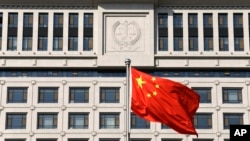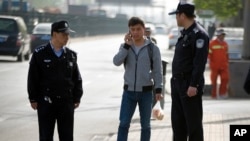Each year, China and the United States hold expansive high-level talks that address everything from tensions in the South China Sea or on the Korean peninsula to investment obstacles.
U.S. officials have said the talks are like a stabilizer that helps cushion broader relations and manage frictions.
Rights groups and activists, however, argue that increasingly there is one topic that could use more focus at the annual meeting - human rights.
Specifics needed
Just before this year's meetings began, Reporters Without Borders and nine other rights groups sent a joint letter to Secretary of State John Kerry and U.S. Treasury Secretary Jack Lew calling for action on the issue.
The letter noted efforts the United States has already taken to address what it called the well documented and downward slide of human rights and rule of law since President Xi Jinping became president. That included calling out China at the United Nations Human Rights Council in March over its rights record.
During the meetings, the groups have urged U.S. officials to not only speak out about specific cases of concern, but meet with human rights defenders and representatives of civil society during the meetings, if possible, much as President Barack Obama recently did in Vietnam.
Rights groups note that in recent years, officials have mentioned specific cases of concern in China less frequently because it upsets their counterparts in Beijing. But such discussions also make a big difference, they add, in how individuals are treated and their conditions in custody.
‘One China’ policy
Human rights has long been a topic that is compartmentalized in Sino-U.S. relations, but what is needed now is an integrated approach to the issue, a ‘one China’ policy, said Yang Jianli, founder and president of Initiatives for China.
“We cannot pit human rights against trade or vice versa. Any engagements with China has to take into consideration the human rights issue,” Yang said.
Economic ties and areas of cooperation between the two countries continue to expand, this year the two are expected to sign 12 agreements and reach 135 outcomes. At the same time, the human rights situation in China continues to deteriorate.
As the meetings began Monday, Secretary of State John Kerry noted the issue in passing, but did not mention any specific cases in public.
“It is absolutely vital that we use this meeting in good spirit, in good faith, constructively, to work on those differences, whether they are on human rights or on maritime security or fair trade or cyber or government transparency,” he said.
Foreign NGO law mentioned
Treasury Secretary Jack Lew voiced concern about China’s recent passing of a law that tightens restrictions on foreign NGOs. He noted the benefits China has seen from opening up and integrating with the global economy.
“All sectors were instrumental in this successful integration, including non-governmental organizations. NGOs have served to strengthen our bilateral relationship and have made new forms of cooperation possible,” Lew said. He added that China’s new NGO law would “weaken that foundation by creating an unwelcome environment for foreign NGOs.”
The "Foreign NGO Management Law" is worrying not only because of the powers it gives the public security over groups from overseas, but the impact it will have on domestic NGOs as well, said William Nee, a researcher at Amnesty International in Hong Kong.
It raises questions about “their ability to get funding and whether they will automatically become suspects once they have partnerships with foreign NGOs,” Nee said.
Rights groups have called for China to completely scrap the law, which they argue goes against international standards or at the very least, revise the legislation.
Less talk, the better
China, however, seems increasingly sensitive about efforts to discuss human rights. Just last week, China’s Foreign Minister Wang Yi sparked an international incident when he berated a Canadian journalist for asking a question about human rights.
At home on Chinese social media, Wang Yi has been widely derided for his remarks that the Chinese people were best fit to speak about their human rights situation with many noting that the reality is that those who do end up in jail or worse.
In an editorial Monday on the talks entitled “S&ED Should Be Platform for Frank Dialogue,” the Communist Party-backed and popular nationalistic tabloid, the Global Times said: “More Chinese are tired of U.S. rhetoric against China’s human rights issue and believe it is just a tool used by Washington to compete with China.”
It was unclear how the editorial gauged Chinese public sentiment on the issue, since there is never any independent public opinion polling on such political issues inside China.







